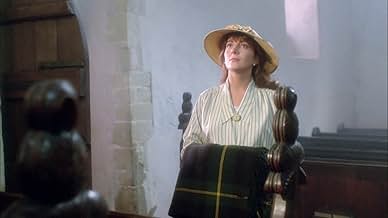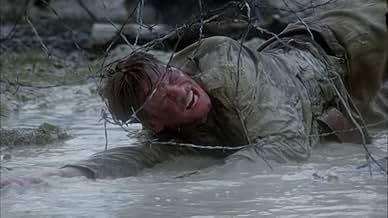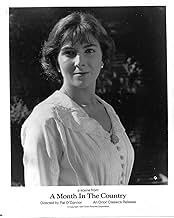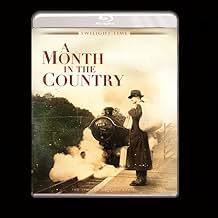IMDb रेटिंग
6.8/10
2.2 हज़ार
आपकी रेटिंग
अपनी भाषा में प्लॉट जोड़ेंTwo soldiers (Colin Firth, Kenneth Branagh) recover from World War I while spending a summer in a Yorkshire village.Two soldiers (Colin Firth, Kenneth Branagh) recover from World War I while spending a summer in a Yorkshire village.Two soldiers (Colin Firth, Kenneth Branagh) recover from World War I while spending a summer in a Yorkshire village.
- पुरस्कार
- 1 जीत और कुल 1 नामांकन
Ken Kitson
- Mr. Sykes
- (as Kenneth Kitson)
फ़ीचर्ड समीक्षाएं
13. A MONTH IN THE COUNTRY (drama, 1987) Birkin, a young WW1 veteran, arrives in the sleepy town of Oxgodby assigned to paint the church. He suffers from nightmares since being shell-shocked. Birkin meets the beautiful Alice (Natasha Richardson), the wife of the local pastor. Though they're immediately attracted to each other, they know they can't be together. But his love for Alice proves a happy respite from his war ravanged life.
Critique: To doze off in a sleepy afternoon watching 'A Month in the Country' feels almost like being there. This beautifully shot, nostalgic look at youth's lost moments, conjures up deeply felt emotions. The town of Oxgodby seems to exist between reality and fantasy. Slowly slumbering away in its own ambiance, unaware of the world around it. Where dreamers go, and weary travelers stumble on their way.
Pat O'Connor's doughty direction may get a bit tedious at times, but it has to be taken in the context of the film's setting (1920s England). Though some scenes do lag in pace, this does not take anything away from the film's dreamy (dark) undertones which are its strong points.
Character conflict is its weakest, however, since most of the characters react passively to the town's underhand prejudice. The best enduring quality is Birkin's lost-love relationship with both the town and Alice.
QUOTE: "God? What God? There is no God?"
Critique: To doze off in a sleepy afternoon watching 'A Month in the Country' feels almost like being there. This beautifully shot, nostalgic look at youth's lost moments, conjures up deeply felt emotions. The town of Oxgodby seems to exist between reality and fantasy. Slowly slumbering away in its own ambiance, unaware of the world around it. Where dreamers go, and weary travelers stumble on their way.
Pat O'Connor's doughty direction may get a bit tedious at times, but it has to be taken in the context of the film's setting (1920s England). Though some scenes do lag in pace, this does not take anything away from the film's dreamy (dark) undertones which are its strong points.
Character conflict is its weakest, however, since most of the characters react passively to the town's underhand prejudice. The best enduring quality is Birkin's lost-love relationship with both the town and Alice.
QUOTE: "God? What God? There is no God?"
I adored the book by J. L. Carr, and was skeptical that Birkin's first person narrative could be conveyed on film. Firth brilliantly makes this internal landscape manifest, while the film provides a sumptuous external setting. All the lead cast strike an effective balance between intensity and restraint. Every time I view the movie, I see things that I hadn't noticed before.
I wish I had seen "A Month in the Country" on the big screen when it was released. The laserdisc looks good, though I wonder what I'm missing. Even though the laserdisc soundtrack is monophonic, it was striking enough to make a friend jump when we were viewed it.
I wish I had seen "A Month in the Country" on the big screen when it was released. The laserdisc looks good, though I wonder what I'm missing. Even though the laserdisc soundtrack is monophonic, it was striking enough to make a friend jump when we were viewed it.
This pastoral English period piece must be one of the quietest anti-war movies ever made, with a single gunshot heard throughout the entire film (except for the brief battleground flashback before the opening credits), and fired only by a sportsman. But its effect is no less traumatic on the shell-shocked protagonist: a veteran of The Great War taking refuge, after the Armistice, in an isolated English village, far away (except in his nightmares) from the trenches. Hired by the local church to excavate a medieval mural above the alter, he uncovers, in no particular order: an age-old mystery; a bittersweet attraction to the vicar's young wife; a kinship with another ex-soldier (Kenneth Branagh, pre-'Henry V') and, finally, some of the dignity he lost in battle. Don't expect any grand gestures from the leisurely told story. Any positive response to the film will depend entirely on a tolerance for such anachronistic virtues as forbearance, charity, and forgiveness.
I saw this film probably 15 years ago, and have never forgotten it. It's about two World War I soldiers who are recuperating at a church. The one is trying to find the remains of the local priest - it's been a while so my brain's a bit rusty - and the other is revealing a mural on the church wall. There's also a love story/triangle to it. It is fabulously acted and demonstrates the horrors faced by men during war time. Kenneth Branagh's performance is worth the price of rental alone. Colin Firth manages to act for a change, rather than seem like he's sleepwalking. (Check out Apartment Zero, another older and decent film.) Exceptional!
It's a love story about rebirth and self healing. The foundation of the plot seems very simple: a young man comes in a town to clean the wall of a church. With a subject like that it could be absolutely boring...but it's not. "Emotion" could be the word to describe it all, though "repressed emotion" would be even more accurate. It's a delicate movie, with thousands of details you might not see the first time; it's deep and truly is a masterpiece in its genre.
Of course to appreciate it you must love repertoire movies. It's not a blockbuster movie...far from that. You must be in a slow mood I guess to enjoy it.
This is the kind of movie I would like to keep in my collection: isn't it a pity that "anonymous" has probably sold his tape already? (I cannot find it in Montreal!)
Of course to appreciate it you must love repertoire movies. It's not a blockbuster movie...far from that. You must be in a slow mood I guess to enjoy it.
This is the kind of movie I would like to keep in my collection: isn't it a pity that "anonymous" has probably sold his tape already? (I cannot find it in Montreal!)
क्या आपको पता है
- ट्रिवियाFilm historian Nick Redman mentions in his commentary included in the BFI edition of the movie that, at the time of its original release, this was said to be a movie "starring two nobodies".
- गूफ़According to Alice Keach, her roses are the variety Sarah Van Fleet. However, the film is set in 1920 and Sarah Van Fleet roses were not introduced until 1926.
- भाव
Reverend Keach: Mr. Birkin, you should know here and now that you employment here does not have my support. But as the solicitors refuse to pay out the £1,000 bequest to our fabric fund until your job is finished I have no choice.
टॉप पसंद
रेटिंग देने के लिए साइन-इन करें और वैयक्तिकृत सुझावों के लिए वॉचलिस्ट करें
- How long is A Month in the Country?Alexa द्वारा संचालित
विवरण
बॉक्स ऑफ़िस
- US और कनाडा में सकल
- $4,43,524
इस पेज में योगदान दें
किसी बदलाव का सुझाव दें या अनुपलब्ध कॉन्टेंट जोड़ें




















